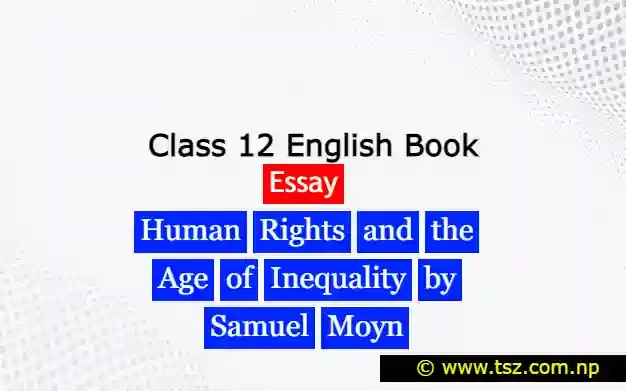Summary of Human Rights and the Age of Inequality by Samuel Moyn Class 12 English
Human Rights and the Age of Inequality Summary by Samuel Moyn Class 12 English with Free
Human Rights and the Age of Inequality Exercise
Main Summary
In “Human Rights and the Age of Inequality,” Samuel Moyn deals with the drastic mismatch between the egalitarian crisis and the human rights remedy that demands not a substitute but a supplement. He points out that the human rights regime and movement are simply not equipped to challenge global inequalities.
Moyn tells a story about Croesus, the last Lydian king, who was rich and thought he was the happiest person on Earth. To him, his people should be happy and free of any pain, but he didn't want to spend his money on them. After he lost, the Persian King Cyrus the Great and his troops took over his money.
The author compares this situation to today's world, where there is a lot of inequality and not enough money and resources for everyone. There hasn't been any progress toward equal rights and property for rich and poor people around the world. In order to solve all of these problems, you need to make sure everyone gets the same amount of money. He finds it hard to do this in real life. To connect the history of human rights with the history of economics, he says that there are two main steps to do:
The first was the heroic era of national welfare states after World War II.
Second, in the 1940s, politics and economics took over the country.
But three important things were left out of Franklin Roosevelt's famous State of the Union call for a second Bill of Rights that included protections for the poor and the middle class: Provincial America's entry into the North Atlantic consensus, which promises and imagines a world without hunger. During the years after 1940, favoritism caused the world to split into two camps: one led by the United States and one led by the Soviet Union. This caused a lot of damage to human rights. Also, post-World War II decolonization did not provide the intended prosperity and human rights because these governments put "national well-being" above "equal rights."
Samuel Moyn asks whether or not there should be another human rights movement. He then uses Herodotus' example of truth and reality, which was about the need for social and economic justice to be transferred from the rich to the poor around the world. They say that everyone has the same amount of freedom and right, but this isn't true in real life. Until and unless this economic and political framework is still in place, humans won't be able to have true freedom and rights. The government must make and enforce laws that make sure that everyone has the same amount of money, and huge and radical movements are important for an egalitarian society.
In the end, our shared fate is to live in the world like Croesus. In this world, the rich have a lot of fun, freedom, and everything, while the poor live in the realm of illusion, where they have floating equality and freedom.
Word Meanings of this essay
parable (n.): a story told to illustrate a moral or spiritual truth
outstrip (v.): to become larger, more important, than sb/sth
ascendancy (n.): the position of having dominant power or control
destitution (n.): lack of sth
repression (n.): the action of forcing desires
generosity (n.): kindness
genocide (n.): the deliberate killing of a nation or race of people
egalitarianism (adj.): showing or holding a belief in equal rights, benefits and opportunities for everybody
preamble (n.): a statement or introduction that comes before sth spoken or written
enumenical (adj.): relating to, or representing the whole of a body churches
countercyclical (adj.): opposing the trend of a business or economic cycle
doppelganger (n.): alter ego
stigmatized (v.): to describe or consider sb/sth as sth very bad, worthy or of extreme
disapproval, etc.
About the author of Human Rights and the Age of Inequality : Samuel Moyn
Samuel Moyn is Jeremiah Smith, Jr. Professor of Law and Professor of History at Harvard University. In 2010, he published The Last Utopia: Human Rights in History, and his most recent book is Christian Human Rights. His areas of interest in legal scholarship include international law, human rights, the law of war, and legal thought, in both historical and current perspectives.
In intellectual history, he has worked on a diverse range of subjects, especially twentieth-century European moral and political theory. He has written several books in his fields of European intellectual history and human rights history. His book Not Enough: Human Rights in an Unequal World (2018) is the most recent work. He is currently working on a new book on the origins and significance of the humane war for Farrar, Straus, and Giroux. Over the years he has written in venues such as Boston Review, the Chronicle of Higher Education, Dissent, The Nation, The New Republic, the New York Times, and The Wall Street Journal.
